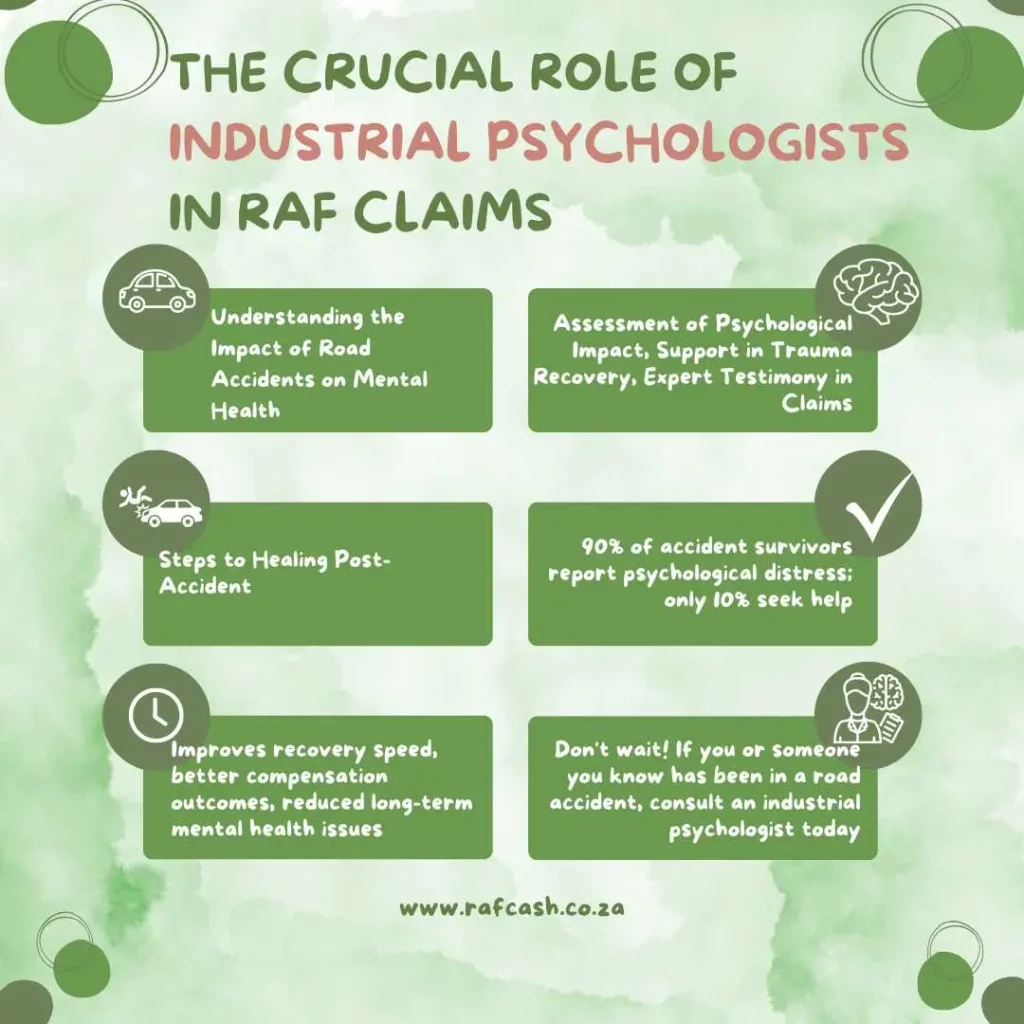Have you ever wondered who ensures that road accident victims in South Africa receive fair compensation for their lost work capabilities?
When a road accident disrupts lives, the journey to recovery and fair compensation is often complex and daunting. Industrial Psychologists (also known as a IP or Industrial Psych) or play a pivotal yet often overlooked role in this process, especially within the framework of the Road Accident Fund (RAF) claims.
This article aims to shed light on the essential contributions of Industrial Psychologists (IP) in the RAF claims process.
By evaluating the impact of accidents on victims’ employability and providing expert testimony, these professionals ensure that victims receive the support and compensation they deserve.
Through detailed assessments and collaboration with other professionals, Industrial Psychologists help navigate the intricate landscape of rehabilitation and legal proceedings.

In the following sections, we will explore what Industrial Psychologists do, their specific roles in RAF claims, the types of assessments they conduct, and the current trends and challenges they face.
We will also look into future developments in the field and provide insights into how these dedicated professionals make a significant difference in the lives of road accident victims.

Understanding Industrial Psychologists
Definition
An Industrial Psychologist is a professional who applies psychological principles and research methods to the workplace to solve problems and improve the quality of work life.
They focus on understanding human behavior in professional settings, aiming to enhance productivity, employee satisfaction, and overall organizational efficiency.
Primary Responsibilities
Workplace Assessment and Improvement
Industrial Psychologists analyze organizational structures, work environments, and processes to identify areas for improvement. This includes conducting job analyses, developing job descriptions, and creating efficient workflows.
Their goal is to optimize the workplace for better performance and employee well-being.
Employee Selection and Development
These professionals design and implement recruitment processes, selection tests, and interview techniques to ensure the best candidates are hired.
They also develop training programs to enhance employee skills and performance, ensuring that the workforce is well-equipped to meet organizational goals.
Performance Evaluation and Management
IPs create performance appraisal systems to assess employee performance, provide feedback, and develop strategies for performance improvement.
They help organizations establish fair and effective methods for evaluating and managing employee contributions.
Research and Data Analysis
Conducting research on workplace behavior and analyzing data to understand trends is a key responsibility.
Industrial Psychologists use employee satisfaction surveys, productivity studies, and ergonomic assessments to gather data and inform decision-making, aiming to create a better work environment.
Organizational Development
These professionals assist organizations in managing change, improving team dynamics, and fostering a positive organizational culture.
This can include conflict resolution, leadership development, and strategic planning, all aimed at enhancing overall organizational effectiveness.

Health and Well-being
Industrial Psychologists focus on improving employee well-being and mental health.
They design interventions to reduce stress, improve work-life balance, and create supportive work environments, ensuring that employees remain healthy and productive.
Legal and Ethical Issues
Ensuring that workplace practices comply with laws and ethical standards is another critical role.
Industrial Psychologists address areas such as discrimination, harassment, and fair labor practices, helping organizations maintain a lawful and ethical work environment.
By fulfilling these responsibilities, Industrial Psychologists play a crucial role in creating productive, healthy, and efficient workplaces.
Their expertise is especially vital in contexts like the Road Accident Fund claims process, where they help assess the impact of accidents on victims’ work lives and support their journey to recovery and fair compensation.

Role of Industrial Psychologists in RAF Claims
Assessing Impact on Employability
How Industrial Psychologists Evaluate the Effect of Road Accidents on a Claimant’s Ability to Work
When a road accident occurs, it can have a profound impact on a victim’s ability to perform their job. Industrial Psychologists are tasked with evaluating the extent of these impacts. They conduct detailed assessments that consider the physical, cognitive, and emotional injuries sustained and how these affect the claimant’s ability to fulfill their job responsibilities.
This evaluation involves a comprehensive analysis of the claimant’s pre- and post-accident work capabilities.
Importance of Vocational Assessments
Vocational assessments are crucial in this process. These assessments help determine the claimant’s current work capacity, taking into account their skills, qualifications, and the demands of their previous job.
They also explore the potential for the claimant to engage in alternative employment. By understanding the claimant’s abilities and limitations, Industrial Psychs can provide a clear picture of the accident’s impact on their employability.

Determining Economic Losses
Calculation of Loss of Earnings and Future Earning Potential
One of the key roles of Industrial Psychologists in RAF claims is to calculate the economic losses suffered by the victim. This includes both the immediate loss of earnings and the future earning potential that may be affected due to the accident.
They consider factors such as the claimant’s age, career trajectory, and potential promotions that could have occurred if the accident had not happened.
Example Calculations to Illustrate the Process
For example, if a claimant was earning R300,000 per year before the accident and, due to injuries, can now only earn R150,000 per year, the immediate annual loss is R150,000. If this reduced earning capacity is projected over the next 10 years, the total future earnings loss would be R1,500,000.
These calculations help in determining fair compensation for the claimant.

Rehabilitation and Return to Work Planning
Development of Tailored Rehabilitation Plans
Industrial Psychologists play a vital role in developing tailored rehabilitation plans for accident victims. These plans are designed to help the claimant regain their ability to work and can include physical therapy, occupational therapy, counseling, and retraining programs.
The goal is to facilitate the claimant’s return to their previous job or help them transition to a new role that accommodates their limitations.
Recommendations for Workplace Accommodations
To support the claimant’s return to work, Industrial Psychologists may recommend specific workplace accommodations. These can include modifications to the work environment, changes in job duties, or the provision of assistive devices.
Such accommodations are essential in ensuring that the claimant can perform their job effectively despite their injuries.

Expert Testimony in Legal Proceedings
Providing Objective Evaluations and Expert Testimony in Court
In the legal proceedings of RAF claims, Industrial Psychologists often provide expert testimony. Their objective evaluations are crucial in helping the court understand the full impact of the accident on the claimant’s employability and economic situation.
They present their findings in a clear and unbiased manner, supporting the claimant’s case for fair compensation.
Importance of Clear and Unbiased Reports
The reports provided by Industrial Psychologists must be clear, comprehensive, and unbiased. These reports form the basis of their testimony and are scrutinized in court.
Therefore, it is essential that these documents accurately reflect the claimant’s condition and the impact of the accident on their work life.
Clear and detailed reports help ensure that the claimant’s losses are fully recognized and compensated.
Through these roles, Industrial Psychologists ensure that road accident victims receive the necessary support and fair compensation to rebuild their lives and regain their independence.
Their expertise is indispensable in navigating the complexities of RAF claims, providing both legal and practical assistance to those affected by road accidents.

Specific Assessments Conducted
Vocational Assessment
Details and Purpose
A vocational assessment is designed to evaluate a claimant’s ability to return to work or find alternative employment following a road accident. This comprehensive evaluation includes analyzing the claimant’s skills, experience, and educational background.
The purpose is to determine whether the claimant can return to their previous job, requires modifications to their current role, or needs to transition to a different type of work altogether.
Psychometric Testing
Tools Used and What They Measure
Psychometric testing involves a series of standardized tests that measure various cognitive, emotional, and psychological attributes. Tools such as the Wechsler Adult Intelligence Scale (WAIS) and the Beck Depression Inventory (BDI) are commonly used.
These tests assess cognitive functions like memory, attention, and problem-solving abilities, as well as emotional states such as anxiety and depression. The results provide valuable insights into how the accident has affected the claimant’s mental and emotional health.

Work Capacity Evaluation
Components and Importance
A work capacity evaluation assesses the claimant’s physical and mental ability to perform work-related tasks. This evaluation typically includes functional capacity evaluations (FCE), which measure physical abilities such as strength, endurance, and flexibility, as well as cognitive assessments to determine mental capacities.
The importance of this evaluation lies in its ability to provide a clear picture of what tasks the claimant can perform, helping to identify suitable job roles and necessary accommodations.
Earnings Capacity Evaluation
How It Is Conducted and Its Impact
Earnings capacity evaluation involves estimating the economic impact of the accident on the claimant’s ability to earn an income. This process includes analyzing the claimant’s pre-accident earnings, projecting future earnings potential, and calculating the loss due to reduced work capacity.
The impact of this evaluation is significant, as it helps determine the amount of compensation required to cover lost earnings and future financial stability.
Transferable Skills Analysis
Identifying Alternative Job Options
Transferable skills analysis identifies skills that the claimant possesses which can be applied to alternative job roles. This assessment considers the claimant’s current abilities, work experience, and the labor market to suggest viable job options that accommodate any limitations resulting from the accident.
The goal is to help the claimant transition smoothly into a new role that leverages their existing skills while accommodating their post-accident condition.

Career Counseling and Rehabilitation Planning
Steps Involved
Career counseling and rehabilitation planning involve several steps:
- Initial Assessment: Evaluating the claimant’s current situation, including their physical and psychological health, skills, and job market opportunities.
- Goal Setting: Establishing realistic and achievable career goals based on the claimant’s abilities and interests.
- Rehabilitation Plan: Developing a personalized plan that may include physical therapy, vocational training, and psychological support.
- Implementation: Assisting the claimant in following the rehabilitation plan, including job search assistance and arranging workplace accommodations.
- Follow-Up: Regularly monitoring the claimant’s progress and making necessary adjustments to the plan.

Functional Job Analysis
Understanding Job Requirements Post-Accident
Functional job analysis breaks down the specific tasks and responsibilities of a job to determine the physical, cognitive, and emotional demands. This analysis helps understand how the claimant’s injuries affect their ability to perform these tasks.
By identifying the exact requirements, Industrial Psychologists can recommend suitable job modifications or alternative roles that fit the claimant’s post-accident capabilities.
Medical and Psychological History Review
Importance of Comprehensive Background Checks
A thorough review of the claimant’s medical and psychological history is crucial for accurate assessment. This review includes examining medical records, previous treatments, and psychological evaluations to understand the pre-existing conditions and the impact of the accident.
Comprehensive background checks ensure that all factors influencing the claimant’s health and work capacity are considered, providing a holistic view of their situation.

Ergonomic Assessment
Evaluating and Improving the Work Environment
Ergonomic assessments focus on optimizing the claimant’s work environment to accommodate their physical limitations and enhance productivity. This evaluation involves analyzing the workstation setup, equipment used, and work processes.
Recommendations may include adjusting desk heights, providing ergonomic chairs, or implementing assistive devices. Improving ergonomics helps reduce strain and prevent further injuries, facilitating a more comfortable and efficient work environment for the claimant.
These specific assessments conducted by Industrial Psychologists are critical in the RAF claims process.
They provide a detailed understanding of how road accidents affect a claimant’s ability to work, inform the development of tailored rehabilitation plans, and support the determination of fair compensation for the victim’s losses.

Contribution of These Assessments
Quantifying Losses
How Assessments Provide a Detailed Understanding of Economic and Vocational Losses
The assessments conducted by IPs play a crucial role in quantifying the losses experienced by road accident victims. By evaluating the claimant’s physical, cognitive, and emotional capabilities, these assessments provide a detailed picture of how the accident has impacted their ability to work.
This includes immediate losses, such as the inability to return to their previous job, and long-term losses, such as diminished career growth and future earning potential.
For instance, if a claimant was earning R300,000 per year before the accident and is now only able to earn R150,000 annually, the assessments help quantify this loss and project it over the claimant’s remaining working years, providing a clear basis for compensation claims.
Informing Rehabilitation Plans
Using Assessment Results to Develop Effective Rehabilitation Strategies
The detailed information gathered from various assessments is invaluable in developing personalized rehabilitation plans. Industrial Psychologists use these results to identify specific rehabilitation needs, such as physical therapy, vocational training, and psychological counseling.
By understanding the claimant’s current abilities and limitations, they can create targeted strategies to help the claimant regain their independence and work capabilities.
For example, a functional capacity evaluation might reveal that a claimant can no longer perform heavy lifting but can manage tasks that require fine motor skills, leading to a recommendation for retraining in a less physically demanding role.

Supporting Legal Claims
The Role of Detailed Reports in the Legal Process
Detailed and objective reports generated by Industrial Psychologists are essential in the legal process of RAF claims. These reports provide a comprehensive overview of the claimant’s condition, the impact of the accident on their work capacity, and the economic losses incurred. In court, these reports serve as critical evidence, supporting the claimant’s case for fair compensation.
The clarity and thoroughness of these reports help legal professionals and judges understand the extent of the claimant’s losses and the justification for the compensation sought.
By providing expert testimony, Industrial Psychologists further reinforce the credibility of these reports, ensuring that the claimant’s rights are upheld.
Enhancing Quality of Life
Ensuring Victims Receive Fair Compensation and Necessary Support
Ultimately, the goal of these assessments is to enhance the quality of life for road accident victims. By accurately quantifying losses and informing effective rehabilitation plans, Industrial Psychologists help ensure that victims receive fair compensation and the support they need to rebuild their lives.
Fair compensation covers not only lost earnings but also the costs of ongoing medical care, rehabilitation, and any necessary accommodations in the workplace. This holistic approach ensures that claimants are not only financially supported but also given the tools and resources to achieve the best possible recovery and reintegration into the workforce.
Through these comprehensive assessments, Industrial Psychologists contribute significantly to the RAF claims process.
They provide a detailed and accurate understanding of the impact of accidents on victims’ work capabilities and economic potential, support legal claims with clear and unbiased reports, and help develop effective rehabilitation strategies.
By doing so, they play a vital role in ensuring that road accident victims receive the compensation and support they need to improve their quality of life.

Challenges Faced by Industrial Psychologists
Complexity of Assessments
Managing Multifaceted Evaluations
Industrial Psychologists are tasked with conducting comprehensive assessments that cover various aspects of a claimant’s capabilities and limitations. These evaluations include physical, cognitive, emotional, and vocational components, each requiring specific expertise and tools.
Managing such multifaceted evaluations can be challenging, as it demands a thorough understanding of different assessment techniques and the ability to synthesize information from multiple sources to provide an accurate picture of the claimant’s condition.
Resource Limitations
Access to Services and Funding Constraints
In South Africa, access to necessary services and funding constraints can significantly impact the ability of Industrial Psychologists to perform thorough assessments. Limited availability of specialized medical and psychological services, especially in rural areas, can hinder the evaluation process.
Additionally, funding limitations can restrict the scope of assessments and the implementation of recommended rehabilitation plans, affecting the overall support that victims receive.

Legal and Administrative Hurdles
Navigating the RAF Claims Process
The RAF claims process is often complex and bureaucratic, presenting significant legal and administrative hurdles. Industrial Psychologists must navigate this intricate system, ensuring that their assessments and reports meet legal standards and are admissible in court.
This requires a thorough understanding of legal requirements and the ability to work closely with legal professionals to ensure that all necessary documentation is prepared correctly and on time.
Variability in Victim Circumstances
Adapting Assessments to Diverse Backgrounds
Claimants come from diverse socioeconomic and cultural backgrounds, each with unique circumstances that must be considered during assessments. Industrial Psychologists need to adapt their evaluation methods to account for these differences, ensuring that assessments are relevant and accurate for each individual.
This involves tailoring assessment tools and approaches to suit the claimant’s specific context, which can be challenging and time-consuming.

Economic Factors
Impact of South Africa’s Job Market on Assessments
South Africa’s job market, characterized by high unemployment rates and economic disparities, can complicate the assessment of future earning potential and vocational prospects.
Industrial Psychologists must consider these economic factors when conducting their evaluations, making it difficult to provide accurate projections for the claimant’s future employment opportunities and earnings.
This requires a deep understanding of the local job market and economic trends.
Cultural and Language Barriers
Ensuring Assessments Are Culturally Sensitive and Linguistically Appropriate
Cultural and language differences can pose significant challenges in the assessment process. Industrial Psychologists must ensure that their assessments are culturally sensitive and linguistically appropriate, to accurately capture the claimant’s condition and capabilities.
This involves using culturally relevant assessment tools and, when necessary, working with interpreters or cultural mediators to facilitate effective communication.

Impact of Psychological Trauma
Addressing PTSD and Other Psychological Issues
Road accident victims often suffer from psychological trauma, such as PTSD, anxiety, and depression, which can significantly affect their ability to work and participate in assessments.
Industrial Psychologists must be skilled in identifying and addressing these psychological issues, ensuring that their evaluations take into account the full impact of trauma on the claimant’s life.
This requires specialized training and the ability to provide or recommend appropriate psychological support and interventions.

Collaboration with Other Professionals
Coordinating with Medical, Legal, and Vocational Experts
Effective collaboration with other professionals is crucial for comprehensive and accurate assessments. Industrial Psychologists must coordinate with medical professionals, legal experts, and vocational specialists to gather all necessary information and provide a holistic evaluation of the claimant’s condition.
This interdisciplinary approach ensures that all aspects of the claimant’s health and vocational prospects are considered, but it also requires excellent communication and coordination skills.
By understanding and addressing these challenges, Industrial Psychologists can improve the accuracy and effectiveness of their assessments, ensuring that road accident victims receive the support and compensation they need.
Despite these obstacles, their expertise remains invaluable in the RAF claims process, helping to navigate the complexities and provide fair outcomes for claimants.

Current Trends and Innovations
Use of Technology in Assessments
Telepsychology and Remote Assessments
The use of telepsychology has become increasingly prevalent. Remote assessments allow Industrial Psychologists to reach victims in rural or underserved areas, providing continuity of care without the need for in-person visits.
This approach not only enhances accessibility but also ensures that assessments can be conducted efficiently and effectively regardless of geographical limitations.
Virtual Reality Simulations
Virtual reality (VR) is emerging as a powerful tool in vocational assessments. By creating realistic simulations of work environments, VR allows Industrial Psychologists to evaluate a claimant’s functional capabilities in a controlled and immersive setting.
This technology helps in assessing physical and cognitive abilities, identifying limitations, and determining suitable job roles or accommodations.

Digital and Online Assessment Tools
Digital platforms and online assessment tools streamline the evaluation process by offering standardized tests that can be administered and scored electronically. These tools provide real-time data and insights, enabling Industrial Psychologists to conduct thorough and efficient assessments.
Online platforms also facilitate better record-keeping and data management, enhancing the overall assessment process.
Holistic and Interdisciplinary Approaches
Integrated Care Models
Integrated care models emphasize collaboration among multidisciplinary teams, including Industrial Psychologists, medical professionals, occupational therapists, and legal experts. This holistic approach ensures that all aspects of a claimant’s health and vocational prospects are considered, leading to more comprehensive and effective rehabilitation plans.
By working together, these professionals can provide coordinated care that addresses the physical, psychological, and social needs of the claimant.

Biopsychosocial Assessments
The biopsychosocial model is gaining traction in the assessment of road accident victims.
This approach considers the interplay of biological, psychological, and social factors in a claimant’s recovery and work capacity.
By incorporating this model into their evaluations, Industrial Psychologists can develop more nuanced and personalized rehabilitation strategies that address the full spectrum of a claimant’s needs.
Advanced Data Analysis and Predictive Modeling
Predictive Analytics and Machine Learning
Predictive analytics and machine learning are revolutionizing the field of vocational rehabilitation. By analyzing large datasets, these technologies can identify patterns and trends that inform predictions about a claimant’s recovery trajectory and future work capacity.
Predictive models help Industrial Psychologists develop more accurate and tailored rehabilitation plans, enhancing the likelihood of successful outcomes.
Big Data in Vocational Rehabilitation
Big data analytics allow Industrial Psychologists to leverage vast amounts of information to improve their assessments. By examining data from previous claims, labor market trends, and rehabilitation outcomes, they can make more informed decisions about a claimant’s vocational prospects.
This data-driven approach ensures that rehabilitation strategies are based on evidence and best practices, ultimately benefiting the claimant.

Enhanced Reporting and Communication Tools
Interactive and Automated Reporting Systems
Innovations in reporting and communication tools are enhancing the way Industrial Psychologists document and share their findings. Interactive and automated reporting systems allow for the creation of dynamic, user-friendly reports that can be easily understood by all stakeholders.
These systems ensure that reports are comprehensive, consistent, and quickly generated, facilitating better communication and decision-making in the claims process.
Focus on Mental Health and Well-Being
Trauma-Informed Care
Trauma-informed care is becoming a cornerstone in the assessment and rehabilitation of road accident victims. This approach recognizes the pervasive impact of trauma on an individual’s mental health and emphasizes the need for sensitive and supportive care.
Industrial Psychologists trained in trauma-informed practices can better address the psychological needs of claimants, ensuring that their mental health is prioritized throughout the rehabilitation process.

Longitudinal Mental Health Monitoring
Longitudinal monitoring of mental health is critical in understanding the long-term effects of road accidents on claimants. Regular follow-up assessments allow Industrial Psychologists to track changes in a claimant’s mental health over time, adjusting rehabilitation plans as needed.
This continuous monitoring ensures that claimants receive ongoing support and that any emerging issues are promptly addressed.
By embracing these current trends and innovations, Industrial Psychologists can significantly enhance their assessments and rehabilitation strategies, providing more effective support for road accident victims.
These advancements not only improve the accuracy and efficiency of evaluations but also ensure that claimants receive comprehensive and holistic care tailored to their unique needs.

Future Role and Potential Policy Changes
Evolving Role
Proactive Case Management
As the field of industrial psychology continues to evolve, Industrial Psychologists are expected to take on more proactive roles in case management. This involves not just conducting assessments but also coordinating the entire rehabilitation process for road accident victims.
Proactive case management includes regularly monitoring the claimant’s progress, adjusting rehabilitation plans as needed, and ensuring that all necessary support services are in place.
By actively managing cases, Industrial Psychologists can help ensure that victims receive consistent and comprehensive care throughout their recovery journey.

Policy Advisory Roles
Industrial Psychologists are increasingly being recognized for their expertise in understanding the impact of accidents on work capabilities and economic potential. As a result, they are likely to play more significant roles in advising on policy development.
This includes providing insights and recommendations to government bodies and regulatory agencies on how to improve the RAF claims process and enhance support for accident victims.
By contributing to policy discussions, Industrial Psychologists can help shape regulations that better address the needs of claimants and ensure fair compensation practices.
Enhanced Victim Advocacy
In the future, Industrial Psychologists are expected to become more involved in advocating for the rights and needs of road accident victims. This involves working closely with legal professionals, healthcare providers, and support organizations to ensure that claimants receive the necessary resources and support.
Enhanced advocacy efforts can help raise awareness about the challenges faced by accident victims and promote policies and practices that improve their quality of life.

Policy and Practice Enhancements
Standardization of Assessments
One of the key areas for improvement in the RAF claims process is the standardization of assessments. Developing unified guidelines and protocols for conducting vocational and psychological assessments can help ensure consistency and fairness in evaluations.
Standardized assessments can also enhance the credibility and reliability of the findings, making it easier for legal professionals and judges to understand and trust the conclusions drawn by Industrial Psychologists.
Interdisciplinary Training Programs
To enhance the effectiveness of Industrial Psychologists in the RAF claims process, interdisciplinary training programs should be developed. These programs can provide comprehensive training that covers medical, psychological, legal, and vocational aspects of road accident claims.
By fostering collaboration and understanding among different professionals, these training programs can improve the quality of assessments and rehabilitation plans. They can also help Industrial Psychologists stay updated with the latest best practices and innovations in the field.

Public Awareness Campaigns
Public awareness campaigns can play a crucial role in educating the public about the importance of Industrial Psychologists in the RAF claims process. These campaigns can highlight the valuable contributions of these professionals in assessing the impact of accidents, developing rehabilitation plans, and advocating for fair compensation.
Increased public awareness can lead to greater recognition and support for Industrial Psychologists, ultimately improving the outcomes for road accident victims.
Conclusion
The role of Industrial Psychologists in the RAF claims process is set to expand and evolve, driven by advancements in technology, changes in policy, and a growing recognition of their expertise. By embracing proactive case management, contributing to policy development, and enhancing victim advocacy, Industrial Psychologists can continue to play a vital role in supporting road accident victims.
Policy and practice enhancements, such as standardized assessments, interdisciplinary training programs, and public awareness campaigns, can further strengthen their impact.
As the field progresses, Industrial Psychologists will remain indispensable in ensuring that road accident victims receive the comprehensive support and fair compensation they deserve.
Recap
Throughout this article, we have explored the crucial role of Industrial Psychologists in the Road Accident Fund (RAF) claims process in South Africa.
We began by defining what an Industrial Psychologist is and their primary responsibilities, which include workplace assessments, employee development, performance evaluation, and ensuring health and well-being.
We then delved into the specific assessments these professionals conduct, such as vocational assessments, psychometric testing, work capacity evaluations, and earnings capacity evaluations, all of which contribute to understanding the impact of road accidents on victims.
We discussed how these assessments help in quantifying economic and vocational losses, informing effective rehabilitation plans, and supporting legal claims with detailed and unbiased reports.
The challenges faced by Industrial Psychologists, such as managing complex assessments, navigating resource limitations, and addressing cultural and language barriers, were also highlighted.

Additional Resources
Websites
- South African Society for Industrial and Organisational Psychology (SIOPSA)
- Health Professions Council of South Africa (HPCSA)
- Road Accident Fund (RAF)
Podcasts and Books
- Podcasts:
- The Psych Files by Michael A. Britt, PhD. The Psych Files
- WorkLife with Adam Grant. Available on Apple Podcasts
- Psychology in the Workplace. Available on Spotify
- Books:
- Work and Organizational Psychology: An Introduction to the Profession and Its Key Knowledge Areas by Ian Rothmann and Cary L. Cooper
- The Psychology of Workplace Technology by Michael D. Coovert and Lori Foster Thompson
- Trauma and Recovery by Judith Herman
By exploring these resources, you can gain a deeper understanding of industrial psychology and its critical role in supporting road accident victims and navigating the RAF claims process.
Frequently Asked Questions
What is the role of an Industrial Psychologist in the RAF claims process?
Industrial Psychologists assess how road accidents affect victims’ ability to work and provide expert testimony to ensure fair compensation.
How do Industrial Psychologists assess a victim's employability after an accident?
They conduct comprehensive evaluations considering physical, cognitive, and emotional injuries to determine the victim’s work capacity and potential.
What is a vocational assessment?
A vocational assessment evaluates a claimant’s skills, experience, and potential to return to work or find alternative employment post-accident.
Why is psychometric testing important in RAF claims?
Psychometric tests measure cognitive functions and emotional states, providing insights into how an accident has impacted a victim’s mental and emotional health.
How do Industrial Psychologists calculate economic losses for RAF claims?
They analyze the claimant’s pre- and post-accident earnings, future earning potential, and career trajectory to determine financial losses.
What types of rehabilitation plans do Industrial Psychologists develop?
They create tailored plans that may include physical therapy, vocational training, psychological counseling, and workplace accommodations.
Why is expert testimony from Industrial Psychologists crucial in legal proceedings?
Their unbiased evaluations help courts understand the full impact of an accident on a victim’s work life and justify fair compensation.
How do Industrial Psychologists handle cultural and language barriers in assessments?
They use culturally relevant tools and work with interpreters to ensure assessments are accurate and appropriate for each claimant.
What technological innovations are used by Industrial Psychologists in assessments?
They use telepsychology for remote assessments, virtual reality for work simulations, and digital tools for efficient data analysis.
How do Industrial Psychologists contribute to enhancing the quality of life for accident victims?
By providing detailed assessments and developing effective rehabilitation plans, they ensure victims receive fair compensation and necessary support.
Glossary
- Industrial Psychologist: A professional who applies psychological principles to workplace issues to improve employee well-being and organizational efficiency.
- Vocational Assessment: An evaluation of a person’s skills, experience, and potential to return to work after an injury.
- Psychometric Testing: Standardized tests that measure cognitive functions and emotional states.
- Work Capacity Evaluation: An assessment of an individual’s physical and mental ability to perform work-related tasks.
- Earnings Capacity Evaluation: An analysis to estimate the financial impact of an injury on a person’s future earning potential.
- Transferable Skills Analysis: Identifying skills that can be applied to different job roles post-injury.
- Career Counseling: Guidance provided to individuals to help them manage their career development and work transitions.
- Functional Job Analysis: A detailed examination of job tasks to determine physical, cognitive, and emotional requirements.
- Ergonomic Assessment: An evaluation of the work environment to improve comfort and productivity and reduce strain.
- Telepsychology: The use of telecommunication technology to provide psychological services remotely.
- Biopsychosocial Model: An approach that considers biological, psychological, and social factors in understanding health and illness.
- Predictive Analytics: The use of data, statistical algorithms, and machine learning techniques to identify the likelihood of future outcomes.
- Interdisciplinary Training Programs: Programs that provide training across multiple disciplines to enhance collaborative skills and knowledge.
- Trauma-Informed Care: An approach that recognizes and responds to the effects of all types of trauma.
- Standardized Assessments: Evaluations conducted using consistent methods and criteria to ensure fairness and accuracy.





